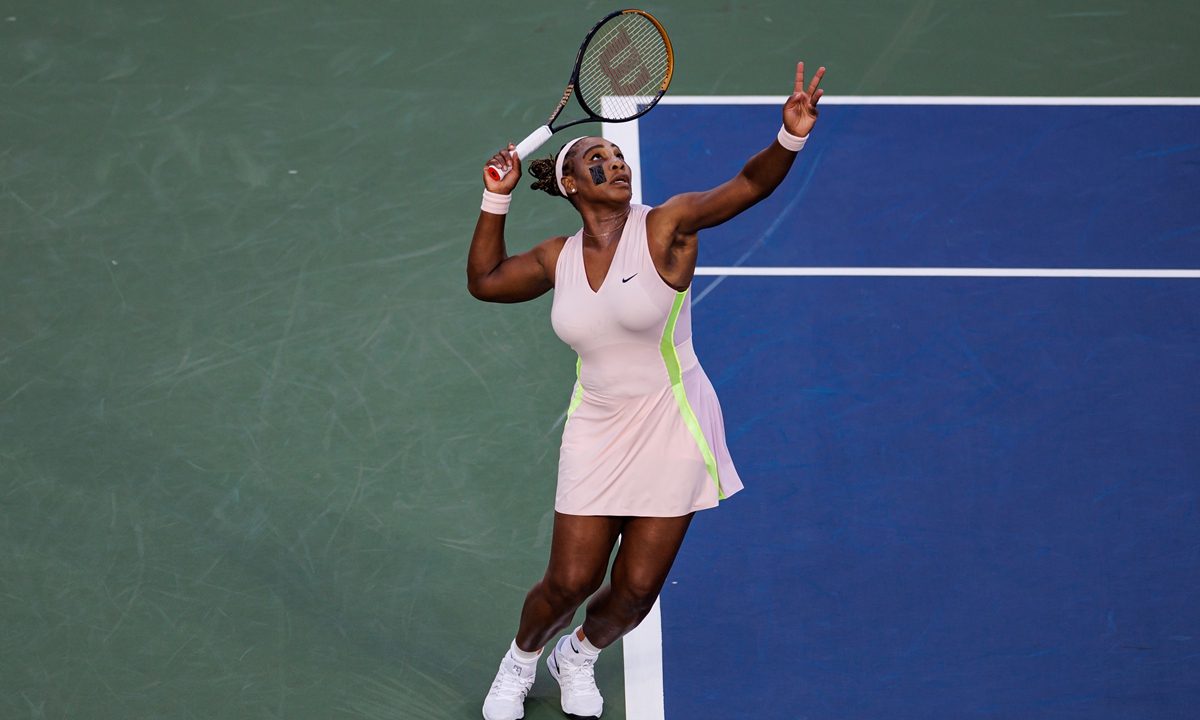
Serena Williams of the US serves at the Lindner Family Tennis Center in Mason, the US on August 16, 2022. Photo: VCG
Whether it's in the powerful ground strokes of players like Coco Gauff or the growing numbers of African-American youngsters surging into tennis camps across the US each year, Serena Williams' influence will be felt long after she hangs up her racquet.
The 23-time Grand Slam champion is expected to confirm her retirement at some point during the next US Open fortnight, ending a career that has straddled four decades and yielded a slew of records that may never be beaten.
A sporting and cultural icon, Williams, 40, along with elder sister Venus, has played a transformative role in changing the face of tennis around the world.
"I think [Serena] as an athlete, not just as a tennis player, has been one of the most important athletes in the history of sport," was the verdict of Rafael Nadal, the 22-time Grand Slam singles king.
Daniil Medvedev, the reigning US Open men's singles champion, added: "In 100 years we're still going to talk about Serena Williams."
Martin Blackman, the US Tennis Association's general manager of player development, has witnessed first-hand the effect that the rise of the Williams sisters has had on the sport.
Blackman, a former tennis professional who is African-American, says Serena and Venus Williams will leave lasting legacies inside and outside of tennis, noting the sisters' rise from the mean streets of south Los Angeles to the pinnacle of their sport.
"The first level of [Serena's] legacy will be a woman along with her sister and their family who were able to come out of a tough situation growing up in Compton, not a lot of resources and play a sport that was still traditionally white and quite expensive, and that story of being able to make that journey to be a champion is the first one," Blackman told AFP.
Transcending tennis
Together, Blackman said, the Williams sisters have transcended tennis.
"I happen to be an African-American man. When I saw Serena and Venus come up and I saw them being confident and comfortable in their skin, that was something that showed me they were really grounded, really secure, really confident. That was a shock to the established tennis society," Blackman said.
"African-American girls out there wearing braids, being themselves, unapologetically. I think at first there was some resistance. I think the commentating was a little bit different.
For them to do that it sent a message to all diverse people - regardless of whether black, Hispanic, gay or lesbian - that you can be successful being yourself."
"That you can be authentic and pave your way without compromising who you are. Over time, that's probably the biggest cultural transformation that they have driven within the sport of tennis."
Blackman said the Williams effect is reflected in the increasing numbers of African-American girls entering USTA tennis camps along with the increasing numbers of black players on the WTA Tour.
"Our numbers in terms of diverse youth have gone up consistently in the last two or three years," Blackman said.
"We have a network of camps throughout the country and I have seen more and more African-American girls coming into the game through those camps, which means they are the best in the country."
At the elite level, a record 12 African-American women played in the main draw of the US Open in 2020.
African-American tennis players have also increasingly graced Grand Slam finals.
Prior to the Williams sisters' emergence, Zina Garrison was the only African-American woman to reach a Grand Slam final in the Open era.
In the past five years, African-American players such as Gauff, Sloane Stephens and Madison Keys have all played in Slam finals, while Japan's Naomi Osaka, whose father is Haitian-American, has won four Grand Slams.
'We followed her'
"If you look at everyone that's our skin color, clearly we followed her," Osaka said. "I think I'm a product of what she's done. I wouldn't be here without Serena, Venus, her whole family."
Gauff, who reached the final of the French Open in 2022, said Serena Williams had been her role model on and off the court.
"Before Serena came along, there was not really an icon of the sport that looked like me," Gauff said.
"So growing up I never thought that I was different because the number one player in the world was somebody who looked like me."
"Sometimes being a woman, a black woman in the world, you kind of settle for less. I feel like Serena taught me that, from watching her. She never settled for less."
AFP
